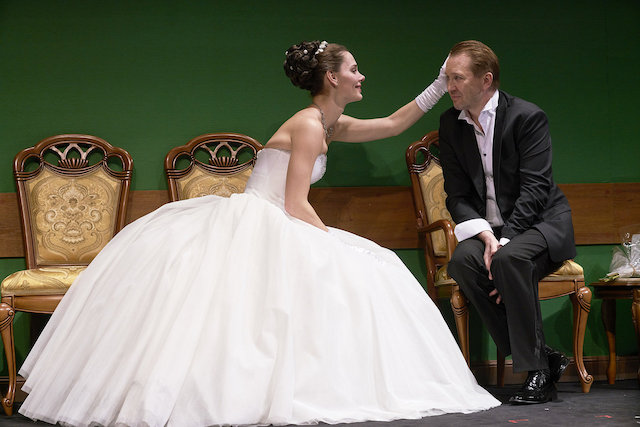by: JK Clarke
Grieving the death of a loved one is universal. We all experience loss — devastating loss — at some point in our lives. So, it would seem that a story of grief and coping would be easy to relate to, though for some reason it rarely is. Most often, we don’t want to hear it lest it revive uncomfortable memories. Other times it’s difficult to relate a play or a movie about loss if it’s revealed the dearly departed wasn’t a particularly likable person. Worse so if none of those suffering from his loss are either. Such are the pitfalls of Catya McMullen’s Rubber Ducks and Sunsets, now playing at the Gene Frankel Theatre. It hasn’t really worked since the thematically similar 1983 hit movie, The Big Chill, and it doesn’t work here.
Though the story begins with a group of friends and roommates who have just returned from the funeral of their very dear artist friend, Rubber Ducks and Sunsets has the look and feel of an overly long, even less funny Saturday Night Live skit, punctuated with often painfully banal and “cutesy” dialog: when one character remarks that something “smells lemony,” they are childishly tapped back with “no, you smell lemony!” These from the mouths of twenty-something bores. Sure, there are people who talk like this, but why on earth would we want to see a play about them? Here are Upper West Side neo-hipsters who dress and behave like Williamsburgers, striving so painfully to be cool yet living in an apartment that looks like it jumped out of a Williams-Sonoma catalog. Like so much of the latest wave of New York City arrivistes, they reek of trust funds.
It’s not the cast’s fault, really. Anna Stromberg is powerful as Casey the emotional best pal of Al (the deceased) and his guitar strumming lover Walter (thoughtfully played by JD Taylor), who punctuates scenes with musical, talky interludes straight out of Hee Haw. Whether or not the character sings and plays guitar badly or if it’s Taylor himself is unclear. What is clear is that perhaps neither one should do so on stage. Otherwise, Taylor is earnest and likable, even if his character isn’t so much. Both he and Stromberg might well be very compelling in other pieces.
The real shortcoming is the writing. For the occasional well written line of dialog — which is mostly just a series of zingers — there are dozens more uncomfortably trite ones. Worse still, one character pilfers a Jack Nicholson line from the film As Good As It Gets, exclaiming to his love interest: “You make me want to be a better man!” It’s hard to say if the use of this sentence constitutes out and out plagiarism, but whether it does or doesn’t, it’s inappropriate to use without acknowledgement. Furthermore, the character who says it — Eli (Josh Evans, who has his moments) — is a poor man’s Kramer, straight out of Seinfeld, right down to the slapstick entrances.
There’s no doubt the stages of grief are a human experience worthy of exploration, but McMullen and director Kate Middleton don’t present us with characters or a scenario worthy of our compassion. Less silly dialog and slapstick and more focus on character depth might have made for a story we could relate to.
Rubber Ducks and Sunsets. Through July 27 at the Gene Frankel Theater, 24 Bond Street.www.groundupproductions.org
























